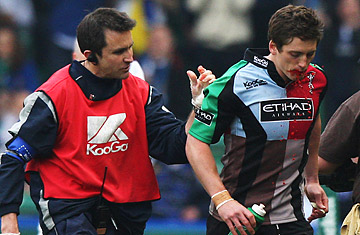
Tom Williams of Harlequins walks off with physio Steph Brennan to be replaced by team mate, Nick Evans, as blood pours from his mouth after faking an injury.
American sports fans might be finding their enjoyment of their favorite games slightly tainted by quarterback Michael Vick's return to the NFL after his conviction for financing a dogfighting ring, or the renewed debate about Pete Rose's life-time ban from baseball. But spare a thought for Europe's rugby fans, whose excitement over the start of a new pro season has been replaced by disgust with the "bloodgate" affair — a scandal involving players faking gory injuries, and sometimes even being mutilated to mask the deception.
On Monday, officials from the European Rugby Cup punished a gaggle of people from the storied London pro club the Harlequins for behavior that, even by modern standards, seems astonishingly under-handed. Harlequins staffers, the club's coach, and one player were banned from the sport for up to three years for staging a blood-gushing injury to help the team gain an illicit advantage over rival Leinster in the dying moments of a European Cup tournament quarter-final match in April. The goal: have a player simulate an open wound in order to exploit an exemption to substitution rules that allows players who've already left the game to return in place of those too bloodied to continue. In the Harlequins' case, that meant getting winger Tom Williams to secretly bite into a synthetic blood capsule, then sending him off as "injured" just in time to bring a place-kicking specialist back on to take a potentially game-winning penalty kick.
Were discovery of that ruse not bad enough, investigations subsequently revealed that former England rubgy great and Harlequins coach Dean Richards — who has since resigned — had used the fake wound ploy on at least four previous occasions. But perhaps worst of all, the British media reports that as suspicion surged around the conveniently timed injury even before the match against Leinster had ended, Harlequins medical staffers rushed to slice a real gash inside Williams' mouth with a scalpel to cover their cheating.
Nice try. On Monday, Richards was given a three-year ban from the sport, while former Harlequins trainer Steph Brennan was suspended for a year. Williams saw his 12-month sidelining lowered to a four-month punishment on appeal. The club, meanwhile, will shell out $425,000 in fines, though that's a milder financial hit than expelling the team from this year's European tournament would have inflicted.
So why did the scheme fail on its fifth time out? The first sign that something was up was the improbable amount of blood that an otherwise chipper-looking Williams spat out after his "injury" — the fake blood capsule released a volume of crimson so spectacular, it could choke a member of Kiss. Also, TV commentators covering the match live noted suspiciously that the injury had befallen Williams at the very moment the Harlequins needed a crack kicker to take the penalty. (The replacement kicker missed, handing Leinster a 5-6 win). And it didn't help that the video consulted after the match provided additional evidence that the injury had been staged.
As for rugby's fans, they can only look sadly upon the incident as yet another, albeit extreme, example of the growing incidence of deception in what has long been known as the gentleman's sport. Ironically, as blatant cheating — from sham injuries to faked fouls — has proliferated in and polluted pro soccer, rugby's tradition of fair play, respect for rivals, and zip-lipped deference to referees has often been cited by soccer purists as an example to follow. Probably no more.
"As for the idea that rugby occupies the gentlemanly high ground of sport, that there is more honor in it than in football or cricket because players don't talk back to referees and have a few pints together afterwards, that's been exposed as the fallacy it always was," wrote Oliver Holt in Wednesday's Daily Mirror newspaper. Still, rugby's troubling evolution may yet be halted — as long as the sport and its players respond to the bloodgate scandal with remedial action, and refuse to simply regard it as a distraction they can forget when the controversy blows over.
